#compared to the katakana
Explore tagged Tumblr posts
Text
Not quite. Kirin/quilin is often TRANSLATED as unicorn for English speakers to understand the creature better, and is sometimes depicted with a single horn, but one google search shows that most east asian art and statues depicts it as a dear-like, scaled creature with two horns and other dragon-like features, like whiskers, sometimes power over water (or fire), beards, etc etc.
Languages that borrow from Chinese often have two different words for unicorn and kirin too. I only know about Chinese and Japanese, so I'll be using Japanese as my way of proving this.
Chinese has a whole new word for unicorns vs kirin (独角兽 vs 麒麟), and Japanese has a few ways, but two are primarily for unicorns (一角獣/ikkakujyuu and ユニコーン/yunikon), while kirin still has the same hanzi/kanji it did in Chinese (麒麟) to set them apart. China has to make new words for western creatures often to not get them all jumbled up (though not always) and this is one of those creatures.
So kirin, in most EA langs, doesn't exactly cleanly mean unicorn, linguistically or myth wise, but translation blips and the similarities the two share make it seem that way.
Of course, this poll is a joke post I made to decide if a shapeshifting OC of mine should be one, since in my head they're like super peaceful dragons and they fit her chimeric nature as well.
If we REALLY want to be purists...or more like true to myth as best as we can, based on what most frequently pops up in stories about them, a kirin is its own thing for sure, since most EA myth paints it as a super peaceful deer-dragon-horse that only shows itself when sages and divine figures are nearby, and when peace reigns in a nation-it serves a different niche from dragons, who range from kind divine figures to storm gods. A kirin seems super close to the popular image of a unicorn, until you remember that unicorns are much more wild and even deadly in some stories compared to the consistently peaceful nature of kirin.
BEFORE I do a Year of the Dragon piece...
#sidhedust rambles#it's a little more complicated than this but I think myth wise no one sees a unicorn and kirin as the same thing#as in no one in japan/china/vietnam/korea sees a kirin statue and thinks ''that's an asian version of a unicorn!''#like..I guess what I'm trying to say is if kirin meant unicorn then...stories about kirin would use that language!#not a single character in kirin even refers to its one horn in Chinese and in JP the reading that does is rare to use for unicorn#compared to the katakana#if you want a nature bending horse with a horn you write about unicorns. if you want a horse that's also a dragon and can bend water/fire-#you write about kirin!
10 notes
·
View notes
Text

So I drew the creatures
(Fun Fact! The power went out when I was still sketching this and I somehow managed to finish it!!)
#art#your turn to die#yttd#yttd Sou#yttd shin#for thoes who don’t read Japanese the Katakana is just Shin and Sou’s name in Japanese#also yes I have Midori as Sou here oops—#yttd Midori#god I’m seeing why people compare my art style to anime now—#traditional art
15 notes
·
View notes
Text
マラソン
#I still have so much trouble with katakana compared to hiragana#fuck that person who was like “i learned them all in an hour” ive been practicing for MONTHS
1 note
·
View note
Text
standing in a blast zone, covered in blood and cuts cause I lost an hour to going last to tenth place in duolingo
#drabblings of dapnee#I more or less learned hiragana but I skipped katakana so I could get xp cause lmao 10 exp for the amount of that compared to the 90 I can#get doing the regular ass lessons lmfao
0 notes
Text
汝よ、くたばれ。反敵意主義などもくたばれ。由無ければなり。
内なる月影の中を忍び寄る翳りたる惡しき者、
媒介者を沁み透り、唾に溶くる喰ひ捲りの素、
内向きの停止裝置惰性、外向きの單純象徵反轉、
内なる淡紫の靈氣によりて呼び出だされし暴れ癖、
許しは讓られ、果てし無き永久の醉ひに迷ひ込み、
彩やかなる氖の通ひ路を通り拔くる天圖り、
幽くなりたる靈氣ぞ、心に傷を負ふ夢幻を通して碎け散りたる。
切り裂かれて朱に塗られたる手首、黃泉に沈み込む總ての亡き魂。
[Classic transliteration]
Nare yo, kutabare. Fantekii syugi nado mo kutabare. Yosi nakereba nari. Uti naru tuki-kage no naka wo sinobi-yoru kageritaru asiki mono, Baikai-sya wo simi-tofori, tuba ni tokuru kufi-makuri no moto, Uti-muki no teisi saũti daseĩ, soto-muki no tanjun syaũtyoũ hanten, Uti naru afa-murasaki no reĩki ni yorite yobi-idasaresi abare-kuse, Yurusi wa yudurare, fate si naki tofa no yofi ni mayofi-komi, Azayaka naru newon no kayofi-di wo tofori-nukuru ama-fakari, Kuraku naritaru reĩki zo, kokoro ni kizu wo ofu yume-maborosi wo tofosite kudake-tiritaru. Kirisakarete ake ni nuraretaru te-kubi, yomi ni sidumi-komu subete no naki tama.
[Modern transliteration]
Nare yo, kutabare. Hantekii shugi nado mo kutabare. Yoshi nakereba nari. Uchi naru tsuki-kage no naka wo shinobi-yoru kageritaru ashiki mono, Baikai-sha wo shimi-tōri, tsuba ni tokuru kui-makuri no moto, Uchi-muki no teishi sōchi dasei, soto-muki no tanjun shōchō hanten, Uchi naru awa-murasaki no reiki ni yorite yobi-idasareshi abare-kuse, Yurushi wa yuzurare, hate shi naki towa no yoi ni mayoi-komi, Azayaka naru neon no kayoi-ji wo tōri-nukuru ama-hakari, Kuraku naritaru reiki zo, kokoro ni kizu wo ou yume-maboroshi wo tōshite kudake-chiritaru. Kirisakarete ake ni nuraretaru te-kubi, yomi ni shizumi-komu subete no naki tama.
fuck you & fuck your anti-hostility principle, ain't mean nothing:
shaded demonic entity creeping through the inner moonlight,
seeping through vectors & dissolving in saliva, binge material,
inward killswitch inertia & outward simple symbol inversions,
violent minded tendencies summoned by inner violet auras,
permission delegated, lost in endless perpetual intoxication,
celestial mapping through the vivid neon shaded hallways,
darkened aura, shattered through these traumatic visions;
wrists slit & slick with vermilion, all lost souls sink below.
#🫀#.#poetry#voidic3ntity#translation to classical japanese#translator’s notes below#the 影 kage part in 月影 tsuki-kage ‘moonlight’ refers to any image created by transforming the normal trajectory of light beams#so it can mean ‘reflection’ or even ‘shadow’ or ‘silhouette’#陰る/翳る kageru ‘to shade; to be obscured’ is obviously a verb derived therefrom#‘vector’ may mean several different things but in this context I took it as referring to ‘a carrier organism’#‘binge material’ was tough to translate; 喰ひ捲り kui-makuri means ‘eating with reckless abandon’; 素 moto here means ‘ingredient; material’#the phrases 停止裝置惰性 teishi sōchi dasei & 單純象徵反轉 tanjun shōchō hanten are comprised of distinctly modern words#but each has the same number of characters so they both are symmetrical to one another in that way#they are also not native japanese words but of chinese origin & sound quite ‘science-y’ (which quite fits within this particular verse)#(the influence of classical chinese on east asian cultures is comparable to that of latin & greek in european cultures)#i noticed the connection betwixt ‘violet’ & ‘violent’ (how synaesthetic!); i tried to recreate it thusly: 淡紫 awa-murasaki & 暴れ癖 abare-kuse#(technically 淡紫 awa-murasaki means ‘pale/faint purple’ so it diverges a little bit from the original meaning)#‘neon’ in modern japanese is a simple loanword written in katakana letters thusly: ネオン neon#so i borrowed the character 氖 which was created specifically to represent ‘neon’ in modern chinese (气 “gas” + phonetic 乃)#in my translation the character 氖 was given a special reading: ネヲン newon#because ‘neon’ comes from the greek νέος néos (‘new’) which in turn evolved from νέϝος néwos#通ひ路 kayoi-ji technically means ‘passage-way’ but i felt that this word would fit better than the literal translation of ‘hallway’#in one of the classical poems there was a phrase 雲の通ひ路 kumo no kayoi-ji ‘the paths amongst the clouds’#which refers to invisible paths that connect heaven & earth#天圖り ama-hakari is a ‘nativised’ reading of 天體圖 tentaizu ‘map of celestial bodies; uranogram’#幽くなりたる靈氣 kuraku naritaru reiki (for ‘darkened aura’) adds an additional layer of meaning by invoking an association with this modern word:#幽靈 yūrei which means ‘ghost; spectre; phantom’ (literally ‘pale/darkened spirit’)#‘traumatic’ → 心に傷を負ふ kokoro ni kizu wo ou ‘that which leaves wounds in one’s heart/soul’#‘visions’ → 夢幻 yume-maboroshi ‘visions; phantasies; dreams’#‘below’ → 黃泉 yomi (name of the underworld in japanese mythology; akin to hades in greek myths)
56 notes
·
View notes
Text
Japanese Linguistic Observations in Spy x Family - part 2
Part 2 - Anya's "Anya-isms"
I think Anya has one of the most interesting ways of speaking out of all the SxF characters. But like with Twilight's dialogue that I previously discussed, it can only be fully appreciated in the Japanese version. Probably the most noticeable thing about her dialogue is how it's written compared to the other characters.
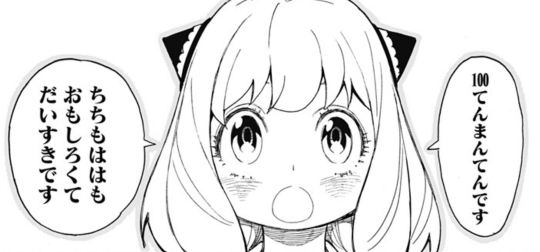
Written Japanese is comprised of three different alphabets: ひらがな (hiragana) and カタカナ (katakana), which together are referred to as "kana," and 漢字 (kanji). Kanji are the characters that hold the meaning of words, while kana simply represent the various Japanese syllable sounds and don't have any meaning on their own (much like the letters of the English alphabet). There are only about 100-ish total unique kana symbols, however, there are over 2,000 kanji in common use today. So Japanese children will start out learning kana and then learn kanji gradually during their school years. This is why Japanese children's books are typically written only or mostly in kana. This is also why manga and books aimed at a younger audience will have kana "translations" of kanji written above kanji characters, which are called furigana.
With that in mind, it's not surprising that all of Anya's dialogue in the Japanese version of the SxF manga is written entirely in kana. Even though using kanji in her dialogue wouldn't necessarily mean she knows kanji, reading a character's dialogue only in kana definitely gives off childish vibes – it conveys feelings of youthfulness and innocence, like "they're speaking only in kana because they don't know the kanji for these words…they're just a little kid, after all." At least, that's the feeling I get when I read Anya's dialogue. Though I haven't read enough manga in Japanese to say for sure, it seems like this concept of making little kids speak only in kana is not unusual, as there's at least one other example I know of: a manga from the mid-2000s called Yotsuba also has a titular 5-year old whose dialogue is written only in kana.
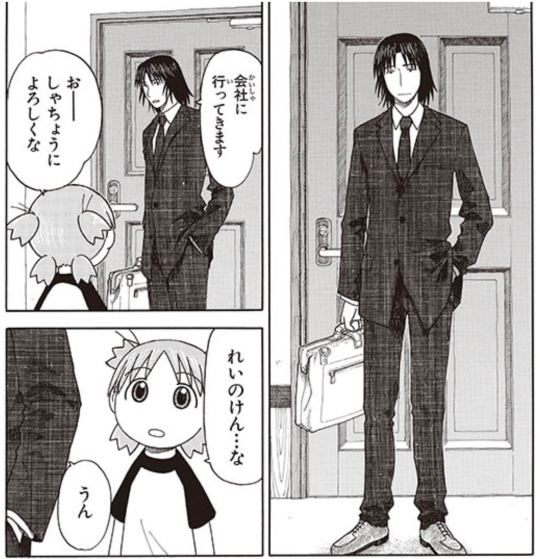
What's also interesting is that all of the other Eden kids speak "normally," using kana and kanji properly in their dialogue. This helps to convey the fact that, despite Anya being roughly the same age as them, their "rich family" upbringing has forced them to grow up faster. In the below panel, you can see how Damian's dialogue uses kanji (with furigana translations) while Anya's uses only kana, even for words that have kanji.
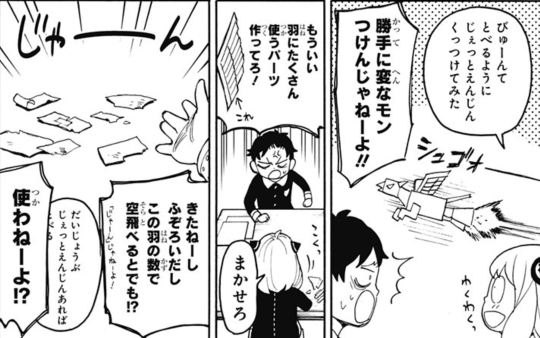
Interestingly, I found at least two cases where Anya does use kanji in her dialogue: when she's calling out the name of her big "Arrow of Light, Seize the Star" move during the dodgeball game, and when she calls out her "Lighting Bolt, Deliver my Aid" move when she tries to throw Yor's weapon back on the deck in the cruise arc. As you can see in the below panels, the names of these "moves" is written in kanji (with furigana translations). This makes sense not only because this is parodying shonen series where the characters shout out the names of their moves, but because it emphasizes how determined Anya was at these moments.
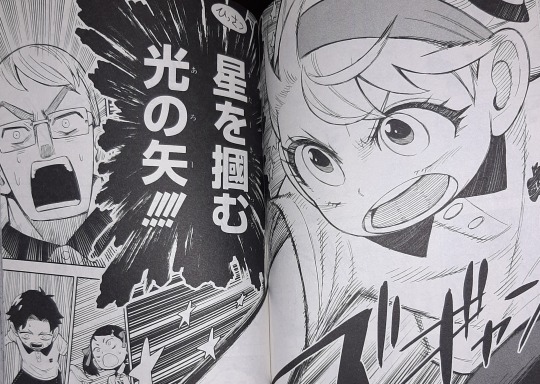
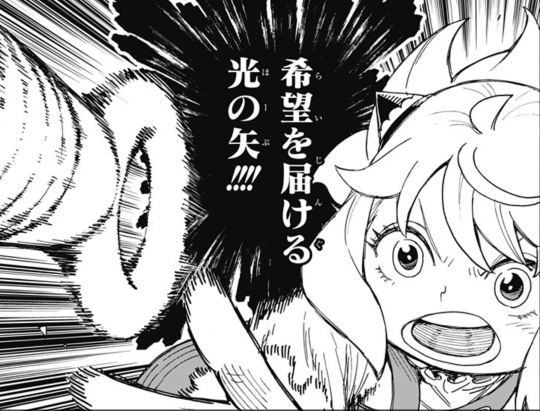
But going back to how Anya's speech compares to the other kids, another thing that stands out is that she speaks very "plainly." Her grammar is (mostly) correct, except for a few mistakes you'd expect a little kid to make. But she uses pretty much no colloquialisms, almost as if she knows the language but lacks the experience for using it in normal social interactions. I don't think this is unusual for a kid her age who's still learning, but it definitely stands out when compared to her classmates. For example, in the below panel, Becky uses normal interjections and other colloquialisms in her speech, like "ne" (ね), "wa" (わ), and "yo" (よ), which are all standard Japanese linguistic devices for softening or emphasizing your sentences. However, Anya doesn't use things like this in her speech. Again, this makes her speech come off as very plain and abrupt, almost like she's not a native speaker.
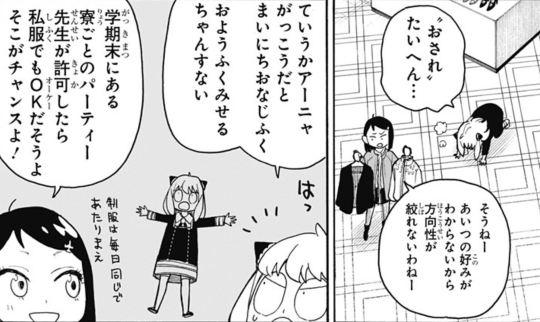
She also refers to herself in third person all the time in the Japanese version. In fact, I don't recall her ever using an "I" or "me" pronoun. I don't know why the English version of the manga doesn't keep this characteristic of her speech. I think it's very important in highlighting the childish aspect of her personality.
Putting all this together – the fact that she doesn't use typical colloquial speech and refers to herself in third person – really emphasizes the childish, naive, and almost baby-like nature of her character. I'm curious if Endo made her speak this way simply to show what a little kid she is compared to her classmates, or if it will somehow tie back to whatever roots she has in classical languages that he keeps hinting at. Regardless, as I mentioned in my full Anya analysis, what she lacks in speech and school smarts, she makes up for in empathy and resourcefulness.
Besides all this, Anya does make typical speech mistakes a normal kid would make, like mishearing words or saying things wrong. She mostly uses casual speech, but does try to use keigo (polite speech) on occasion, though not always correctly. For example, she says "ohayaimasu" (おはやいます) for "good morning" instead of "ohaiyou gozaimasu" (おはようございます).
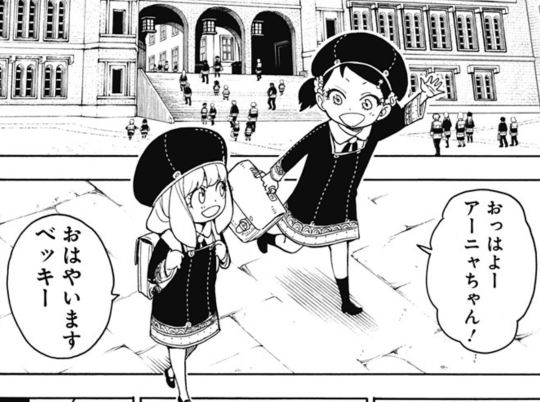
But the most consistent "mistake" she makes (though it's not really a mistake) is what she calls Loid and Yor – "chichi" (ちち) and "haha" (はは) respectively.
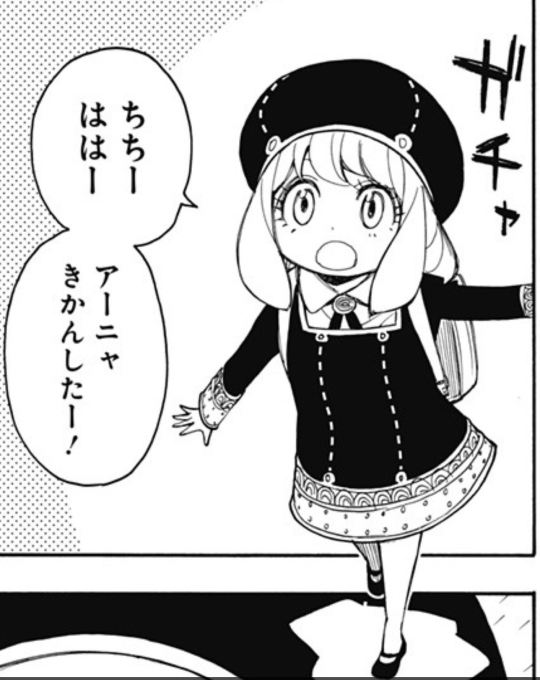
Japanese has many different words for relatives depending on whether you're talking about your own relatives or someone else's, and whether you're talking to them or about them. "Chichi" and "haha" are the general, neutral terms for "father" and "mother," and are also used when talking about your parents to someone else. However, they're not used when talking directly to your mother and father. There are many other words for that, the usual ones being "o-tou-san" (お父さん) and "o-kaa-san" (お母さん), or some variations of these with different honorifics. Damian refers to his dad as "chichi-ue" (父上) which is very formal, while Becky calls her dad the actual English word "papa" (パパ) which is very informal and normal for kids to use. But again, "chichi" and "haha" are typically only used when talking about your parents, not to them the way Anya uses them. This started from the very first chapter where Loid asks her to call him something that sounds "elite." He originally suggests the very formal "o-tou-sama" (お父さま), but when Anya says "chichi," he doesn't bother to correct her.
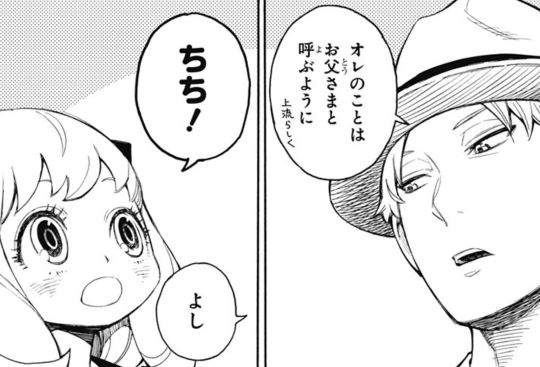
Hearing a little kid call her dad and mom "chichi" and "haha" is kind of like calling them "my father" and "my mother" even when speaking to them directly – it's not wrong necessarily, just strange. But again, this serves to further emphasize the childlike nature of Anya's character.
<- Return to Part 1
Continue to Part 3 ->
616 notes
·
View notes
Text
₊˚⊹♡ silly Fyodor facts!
disclaimer: sources of these are mostly bsd wan, mayoi, official guide books + interviews! more will be added with time!

❥ he's a scorpio [born on november 11th]!
❥ he's very indulgent when it comes to entertaining, for example, Nikolai; playing along when there's a game, and even playfully outsmarting Nikolai -> joking around while remaining a neutral expression
❥ he struggles with writing in Japanese, katakana especially [including his own name. help. cutie.]
❥ he bites his nails and fingers
❥ he got lost at a big train station and was upset about not catching his following train in time. </3
❥ he has a flower-shaped lamp on his desk!
❥ when shibusawa threatened to cry if they wouldn't wear the team outfits he put together, fyodor and dazai complied <3
❥ sellers pressured him into buying and eating roasted chestnuts..
❥ he likes sushi, ice cream, hamburger steak without egg and chinese food!
❥ he hacked the sushi restaurant's order system for his order to arrive faster..
❥ he owns a book named "Frequently Used Japanese"
❥ he has the tendency to silently stare.. [for example at poe, who got anxious in response]
❥ occasionally, he takes things very literally and responds accoddingly
[poe: if i were to breathe this air akin to broth boiling at the bottom of a hellish cauldron, i might get poisoned.
fyodor: to me it seems like there is plenty of room to breathe.
//
nikolai: w- wait, what? you're really giving me something? is this some sort of illusion?
fyodor: no, it is not.]
❥ he enjoys listening to classical music and views it as a reward after a long day
❥ he prays every night before going to sleep
❥ he's fond of long hair on others and likes touching and braiding it, and tying it up
❥ he likes pretty people
❥ he's lonely and is aware that there's no one who supports him, to the point of saying "I am always alone. That is fine by me. Has been, and always will be."
❥ he wishes for the world to be filled with people "pure of heart"
❥ he would gift you a country for valentines day!
❥ he's anemic and describes himself as unhealthy
❥ he plays the cello and the erhu
❥ he claims he hardly feels any appetite [though he seems to like indulging in different kinds of food nonetheless; this might be him forgetting to eat on occasion rather than not liking eating?]
❥ he likes to have jam with his tea
❥ when asked to compare himself to a colour, he said "the white of the snow of my hometown"
❥ his biggest wish [and new year's wish!] is peace for humanity and blessings for the children
❥ he enjoys a dark and gloomy atmosphere and the nighttime scenery
❥ he, at times, braids strands of his hair, or puts it into a small bun or ponytail
❥ occasionally, he drinks red wine
❥ sometimes, he has a bit of a go-with-the-flow attitude; “Well, if Shibusawa-kun is happy, then I'm happy. I'm his friend, after all.”
❥ when he got the opportunity to, he wanted to try on a kimono; he's interested in different cultures

#❥ fyodor! ʚ♡ɞ#Bungo stray dogs#bsd#Fyodor Dostoevsky#Fyodor bsd#Bungo stray dogs fyodor#Bungou stray dogs#Bungou stray dogs fyodor#bsd fyodor#fyodor dostoyevsky bsd
460 notes
·
View notes
Text
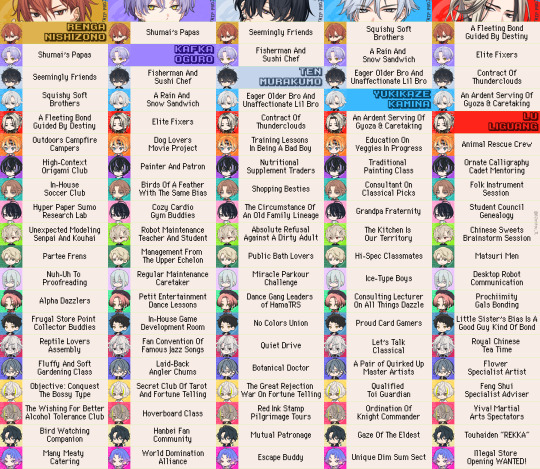
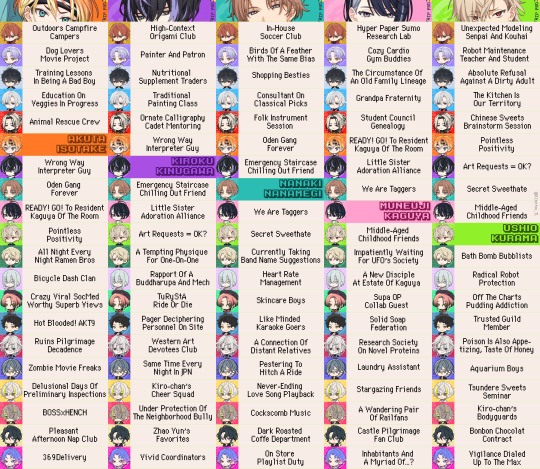
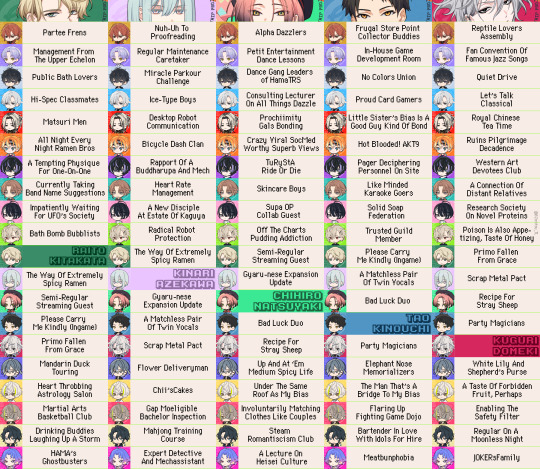

Previously translated pair names that had been posted to Twitter. However corrections had to be made (misinterpretations & an instance of mistranslation), so this is version 2.
Note: This is the only translated thing I will be posting, I am not off hiatus. I had been meaning to archive this before my hiatus, but I also had to fix some things, which is why there was a delay.
Please consult to this post only regarding pair name translations done by me (82mitsu), any other posts or reposts you might see of this chart is the older version. (Previous version has been deleted, but I'm unaware how far the information had spread.)
If any other corrections need to be made, feel free to contact me and I'll make them as soon as possible.
Below follows an extreme lengthy TL note breaking down some pair names, it's a lot of text, so be warned once you unfold the read more.
A lot of research went into these due to 18TRIPs tendency to mix up words, use Gen-Z slang that hasn’t been picked up by everyone yet (or limited to TikTok) and make up their own words (“Omotenashisto” -> “Hospitalister”). I used dictionaries, searched forum results, looked up how people use these words on social media, went TikTok digging, etc.
I tried my best to localize in a way that should make sense even without added context. I only explained the ones that I thought might needed some more back-up in a cultural sense or because it was a specific JPN thing. Thus, not everything has been explained. However, I hope things are clearer compared to the first version that was posted. For Renga & Yukikaze: For ぽゆぽゆ (poyupoyu) there is no definition or anything for this word, but from context clues and digging through how people used it, I deduced that it means something soft and squishy like a plushie or cheeks, so to say. For Renga & Liguang: かりそめの宿縁 (karisome no shukuen) is a Japanese saying about a fated connection of bond that only lasts for a brief moment, but leaves a deep impact on your life. For Renga & Raito: Party is mispelled in the katakana as “paachii” and not the usual “paatii”. Renga has a tendecy to say English words wrong. While “friends” is spelled the correct way, both words have been “mispelled” to drive the point home. For Renga & Kinari: なぁぜなぁぜ (naaze, naaze) is JPN Gen-Z slang from Tiktok. It’s a statement made as an act for complaining, with a bit of sarcasm and irony thrown in at times. Like, “I said I wanna diet but I ate a big meal anyway! なぁぜなぁぜ” or “I’m an idol but I get more anxious doing improv than performances! なぁぜなぁぜ”. Best way I can describe the usage in this context is Renga is throwing a bit of a self-aware tantrum as to why Kinari would correct him. (As mentioned earlier, he isn’t good at English). I guessed a close equivalent would be “nuh-uh”, since that is a dismissal of someone else’s opinion without actual good reason, even if the other person has a point. For Renga & Netaro: まんまん (manman) means “a lot” but I also believe it’s a reference to meatbuns (nikuman). For Kafka & Yodaka: Hanbei is Takenaka Shigeharu, a Japanese samurai from the Sengoku era. He was known for being Toyotomi Hideyoshi’s strategist. For Liguang & Yodaka: 闘牌伝 (touhaiden) is related to Mahjong stuff. 闘牌伝 seems to be an old timey Mahjong video game with RPG elements. Rekka is a fighting game term, and I will quote the website The Fighting Game Glossary by Infil on this: “A type of special move that has multiple stages, as long as you input more commands to continue the sequence. Not all multi-part specials can be called rekkas though; a rekka tends to have exactly three distinct parts and will move your character forward along the ground with each new input.” For Akuta & Nanaki: They went to the same kindergarten and were grouped together in the “Oden Class”. Japanese kindergartens, from my understanding from researching, tend to have a name for their class, rather than a number. To give an idea what such names could be, in 2019 the website hyenasclubs hosted a poll of most commonly used names for classes, and the top 3 were “baby chick” (hiyoko), “peach” (momo) and “dandelion” (tanpopo). For Akuta & Muneuji: My take on はっけよい輝矢部屋 (hakkeyoi kaguya heya) is a bit of an elaborate bit joking with Princess Kaguya of the Moon (from Tale of the Bamboo Cutter) because I was wondering why they suddenly opted for Muneuji’s last name instead of first. (I might’ve also just overestimated Kaguya Heya being some joke on Kaguya Hime). Hakkeyoi is what a referee shouts at the start of a sumo wrestling match. For Akuta & Ushio: I think ポジティブに腕押し (positive ni ude oshi) is a take on 暖簾に腕押し (noren ni ude oshi) that means something has no effect or is pointless. Lit. it means “pushing a curtain with one's arm”. For Akuta & Tao: Akuta Nine is a joke on the baseball movie Gyakkyo Nine which is an adaptation of the manga of the same series, I believe. The movie is referred to as GK9, hence I made it AKT9. For Akuta & Ryui: The original is OYAxKOBU which comes from 親分子分 (oyabunkobun) meaning “boss and his underlings”. Akuta also calls Ryui by “Oyabun”.
For Kiroku & Nanaki: Weebs who watch highschool anime should be familiar with this, but emergency staircase refers to the hallway stairs in a JPN highschool that are sometimes used as chilling out spots by students. For Kiroku & Chihiro: TuRyStA is the clothing brand they wear. 18TRIP has a various selection of clothing brands, which each character having a preference for one or another. For Kiroku & Yodaka: Zhao Yun, as quoted by Wikipedia, “was a military general who lived during the late Eastern Han dynasty and early Three Kingdoms period of China.” For Ushio & Raito: Some heavy freedom was taken with バスボムしゅわリスト (basubamu shuwaristo). After considering how to approach it in the most sensical way, I decided to translate it as “bubblist” due the other options being “hand sign list” or “bubble list”. I thought リスト might function as in -ist, like dentist, artist, guitarist. しゅわ comes from しゅわしゅわ which means bubbly. Although bubblist isn’t not that common, it is sometimes referred to entertainers that do bubble performances (in English). And I think it made more sense than “hand sign list” or “bubble list” to say the least. This was also taking in consideration how 18TRIP, as explained in the intro, gets very creative with its language usage. For Raito & Nagi: Mandarin ducks symbolize “soulmates” of some kind in China. In other words, Mandarin Duck Touring is more along the lines of “Motorcycle touring soulmates”. However, I find the mandarin duck reference and interesting pull compared to just “soulmates”, so it was kept as is. For Kinari & Ryui: “Super Darling Gap Inspection” is more along the original lines. “Gap” in Japanese is usually used in the context of when someone acts one way, but unexpectedly, can act a different way. Ex. A very shy person shows they can be super vulgar, that can be considered a “gap” of some kind. In English, people are more familiar with “gap moe”, thus gap moe was used. For Tao & Nagi: Might be a reference to Yokohama’s Zo-no-hana (Elephant Nose) Park. For Toi & Yodaka: The original is more along the lines of, in the most literal sense, “going around raisins circle (of friends).” Toi likes raisins, but Yodaka doesn’t, so Yodaka passes them onto Toi. I’ve turned into on a play on “sharing is caring” since that’s a common concept in English.
242 notes
·
View notes
Text
A little tidbit about Hypno Callie...
I wanted to touch on a little interesting detail about Hypno Callie because this fascinating thing relating to her dialogue is very much overlooked and for a valid reason. Unless you know Japanese and have played Splatoon 2 in it's original Japanese version then you've probably missed this very cool detail about her.

So what I'm talking about? Well, Callie under the Hypnoshades speaks in katakana. For those who are unaware which is probably... 99% of you, katakana is a form of writing in Japan used for foreign words and accents. Splatoon characters from my knowledge are written in hiragana which is common in Japanese media, however, the only characters that use katakana are Octarians like Marina and Octavio.
As you may or may not know, Octarians actually have their own language and probably have a distinctive accent compared to Inklings which is why their dialogue is written in katakana. Marina's dialogue is written in katakana as she was born in Octarian society and the Inkling language is her second language so she probably has a very strong accent when speaking. Octavio's dialogue is written in katakana because well... He's the leader of the Octarians, duh.
So when Callie is under the Hypnoshades, her dialogue changes to katakana and when the shades get shot off of her, her ability to speak in her regular language slowly gets restored as her dialogue slowly goes back to being hiragana.

So did the shades cause this? Did the shades brainwash her and force the Octarian language into her brain? Well... if you have seen my other posts going over the Hypnoshades in great detail... no. That's not the case, and i have proof!!!
During the Tokaigi 2018 live performance, when Callie recalls the events of Splatoon 2 to joke around with Marie, her dialogue is written in katakana for a brief period. (Rough translation from Inkipedia.)

So what most likely happened is that Callie actually learnt the Octarian language from her time in Octo Canyon and she can speak it with ease. Or she developed an accent from her time being among the Octarians and picked up on the way they speak. Smollusk did state that Callie has Octoling friends and if they aren't talking about Shiver and Marina then we can assume that Callie has other Octoling friends who she can talk to in their language out of respect. It's now a new headcanon for me that Callie speaks with Marina in Octarian in private....

It's actually so interesting to me that Callie was so stunned and dazed from Marie flinging her out of hypnosis and seeping ink into her eye that she was talking between different languages or accents WHILE SINGING AND DANCING! That's insane to think about... Callie was really going through it in Splatoon 2 huh.
(images from frequent.squidsisters on instagram and inkipedia)
#splatoon#callie cuttlefish#callie splatoon#hypno callie#character analysis#rambles#text post#octo canyon#octoling#splatoon marina#marina ida#marie cuttlefish#marie splatoon#shiver hohojiro#shiver splatoon
184 notes
·
View notes
Text
Who Wants To Talk About Japanese Orthography In Manga???
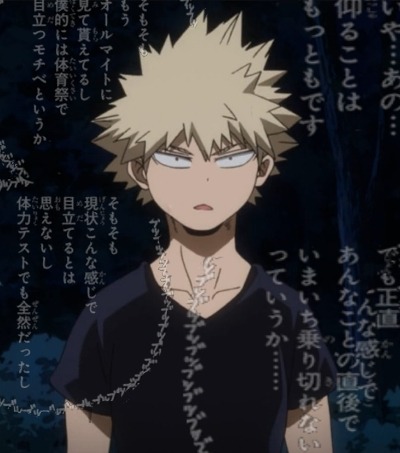
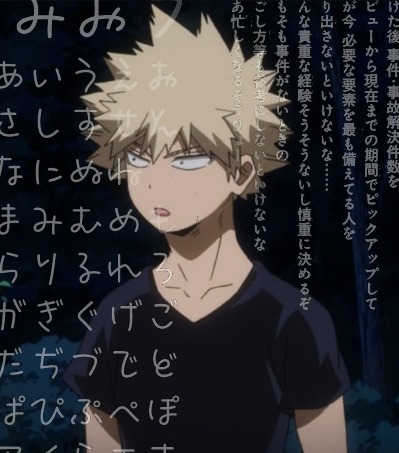
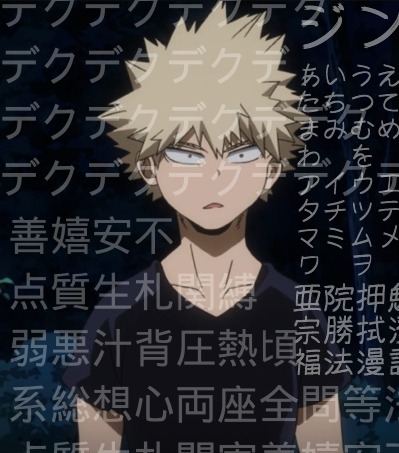
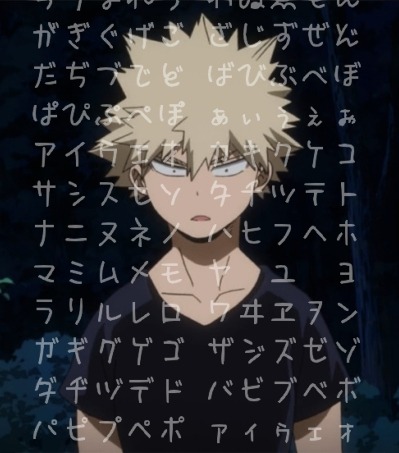
Me, it's me, I do, and I have been chomping at the bit to get the chance to.
Orthography refers to the conventions of written language to represent sounds. That may bring to mind the idea of rigid grammar rules or spelling standardization, but in a linguistic sense, orthography simply describes observable trends across language use. This isn't about authority--I am not going to talk about what schools teach or say people should write one way or another. This is about examining how real people use written language creatively to convey different things in popular media.
This is a huge topic, so I'm only going to use examples from MHA to highlight Horikoshi's style.
First, let's get a run-down of the main parts of written Japanese and how they tend to be used.
We've got kanji and kana; kanji are logograms, while kana are syllabaries. Kana refers to both hiragana and katakana collectively, but we will delineate the two from here on.

The Wikipedia page for kanji, describing this more succinctly than I'm about to.
For clarity, I'm gonna color-code each one.

Let's take a quick look at all three in action.
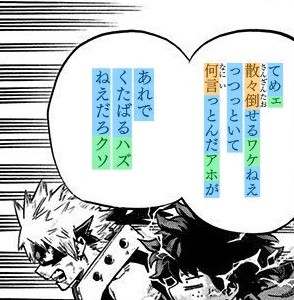
Chapter 65
By virtue of being the syllabary that grammar particles are written in, hiragana can get away with a lot that kanji and katakana can't.
You can write simple sentences in hiragana alone, like so:
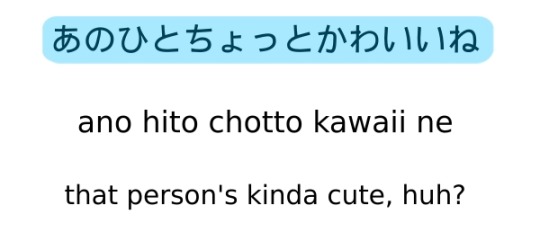
The sentence is perfectly comprehensible like this, but it reads as casual or perhaps a bit immature, like the person is either leaving out kanji for speed or simplicity (like online) or they aren't confident using kanji. Although, the word hito (person) is extremely common and its kanji is simple, so this would probably look more natural:

But there are also kanji for the word kawaii, so you could also write it this way:

On the other hand, writing the whole thing in katakana looks weird as fuck:

bECAuSE iT kINDA reADS LIKE THis, or maybe L I K E T H I S
It seems almost alien, overemphasizing the phonetic sound of the words, implying there's something notable or unusual about them.
But what if you write it like this?

Both ways use katakana to put flavor on a specific word. The first puts it on person, which could be used in a situation where someone hasn't been named yet, but the speaker tonally emphasizes your knowledge of them--like "oh, you know who."
The second emphasizes cute, which could read as sexually suggestive, teasing/joking, or even a threatening tone, depending on the context. "Real cute, ain't they?"
Basically, the connecting grammar bits need to be in hiragana, but nouns, verbs, and adjectives can typically be written in any of the three systems. That introduces choice into the matter, and these choices may have some cultural connotations.
This is a subtlety in written Japanese that manga loves to take advantage of. Orthography contributes a lot to characterization and tone, so individual creators develop little quirks as part of their own writing style.
Now let's finally take a gander at some of Horikoshi's!
Kanji instead of hiragana for semantic emphasis
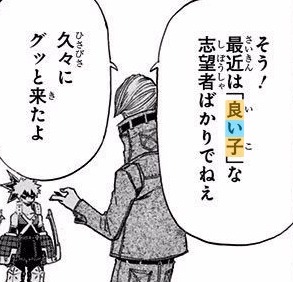
Chapter 48
Best Jeanist could have used only hiragana for the word "good" (いい, ii), which is a very common way to write it. But he's not just commenting that they are nice kids, he's talking about them as "goodie two-shoes" and even puts brackets around the idea. The kanji emphasizes the cultural idea of a Good Child™, a well-behaved, morally upright, obedient young person.
Kanji instead of hiragana denoting a serious or severe tone
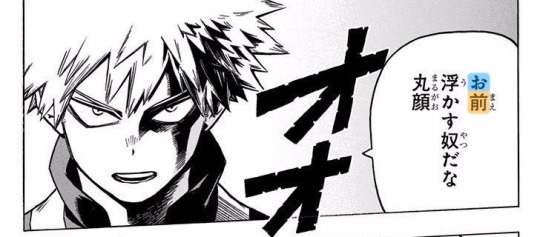
Chapter 36
Katsuki's "you" pronoun omae being written with kanji comes across as markedly serious, especially compared to how his dialogue is normally written. This is actually the only time Katsuki says omae and it is written with kanji--all the rest are in hiragana, which tends to read as more casual.
Hiragana instead of kanji denoting a gentle tone or youthful/childlike language
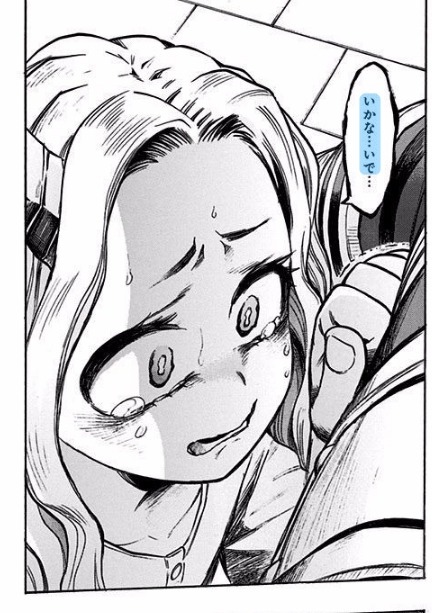
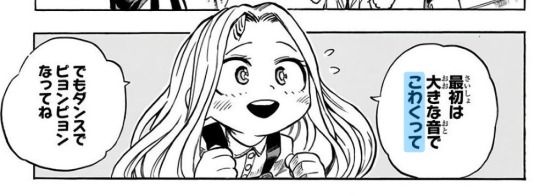
Chapters 129 and 183
Katsuki and his omae show us how kanji use can be seen as more mature and serious; Eri's dialogue does the opposite of this by using hiragana when it could use kanji, emphasizing her youth and innocence.
Katakana instead of hiragana or kanji for emphasis or slang
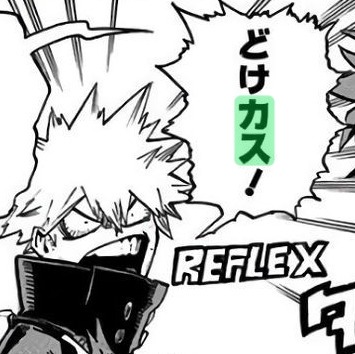
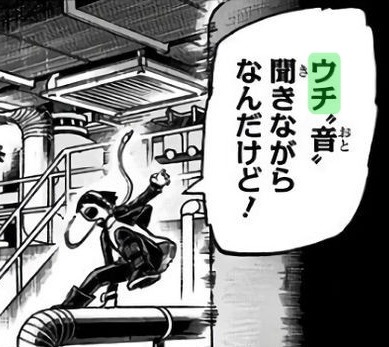
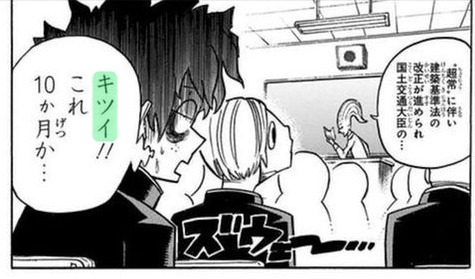
Chapters 209, 207, and 2
As I detailed above, one of katakana's most common uses is similar to italics or all-caps.
But you also tend to see slang written with it, and depending on the slang, the word being in katakana can immediately clarify it from other, perhaps more standard meanings. In Jirou's case, her personal pronoun uchi can mean a couple other things, so it being written in katakana clarifies her usage. It could arguably also imply she is taking a bit of an argumentative tone--Katsuki's slang is typically written in katakana for both of these reasons!
Katakana denoting regional dialect/accent, nonstandard pronunciation/muddled speech, or confused articulation
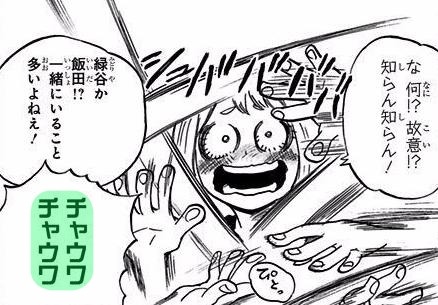
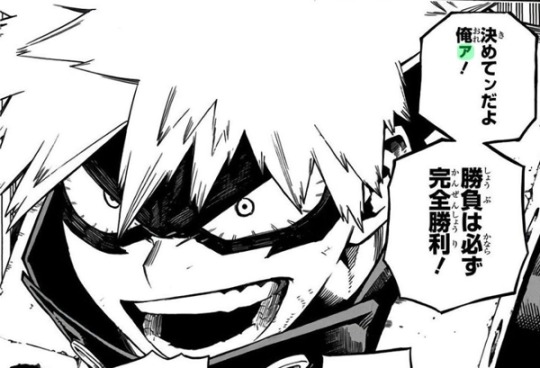
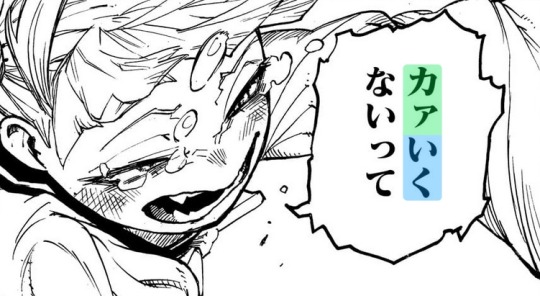
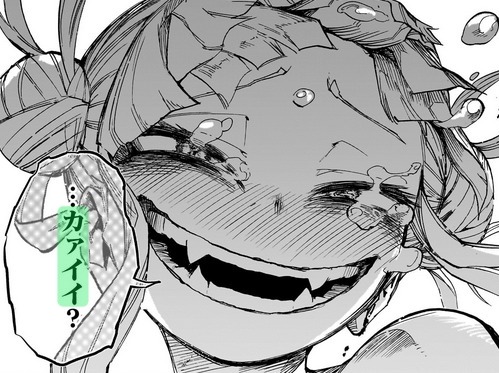
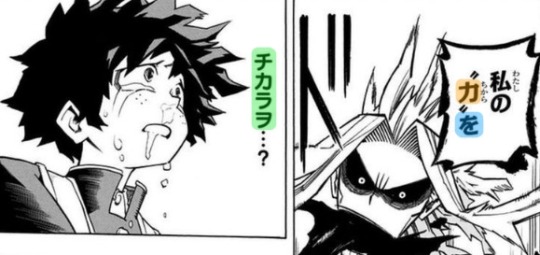
Chapters 102, 208, 394, and 2
Ochako gets flustered and defaults to her regional Kansai dialect. Instead of "chigau wa" (Tokyo dialect), she says "chau wa" repeatedly.
Katsuki and Toga both drop the w- sound from a word. Katsuki says "ore a" instead of "ore wa," while Toga says the word "kawaiku" as "ka'aiku" and "kawaii" as "ka'aii." Notice how the katakana which represents the vocal omission/hiccup is actually smaller than the others? That's also a little stylistic detail for communicating this kind of nonstandard speech.
Izuku repeats All Might's words, chikara wo, in a confused daze because he isn't following All Might's point. By removing the kanji especially, this kind of katakana emphasizes him sounding the words out without recognizing the underlying meaning.
Basically, Japanese has some excellent ~vibes-based~ orthography because of how the language is structured!
Of course, you find this kind of thing in English as well--especially in the age of the internet, where people note that "how dare u" reads as tonally distinct from "how dare you." As you develop language fluency, you tend to pick up these things subconsciously more than anything, but it's one of my favorite things to analyze and compare.
These are just a few examples and my own interpretations of them. I'm sure there are many more uses and flavor-nuance I'm not picking up on. Since any given choice can be read a few different ways, context is very important. My examples aren't definitive proof of anything, but it can be fun to keep these kinds of details in mind while reading.
Shueisha and Shonen Jump surely have in-house standards for text, and mangaka must operate within that range. That said, I have indeed seen every one of these examples in other manga as well.
And on the independent side of things, doujinshi and online manga are basically the wild frickin' west--I have seen tons of totally crazy, highly creative ways to take advantage of the unique flexibility found in Japanese, but that's a post for another day.
I will probably write more about this kind of thing in the future when I can pinpoint some more observations, but I hope you all enjoyed the ride. <3
#meta#linguistics party#this is the nerdiest shit I've ever written and I'm not sorry#I find this soooooo fascinating and fun to think about#people are so cute we think of all kinds of ways to properly convey ideas and feelings and reference shared cultural information#almost all human languages are first and foremost spoken out loud#and human beings get so creative trying to figure out how to express all the complex minute details contained within verbal communication#through the written word#mha 2#mha 36#mha 48#mha 65#mha 102#mha 129#mha 183#mha 207#mha 208#mha 209#mha 394
175 notes
·
View notes
Text

The ``4 people'' of Team 7 are enjoying the summer in the countryside. Kakashi in a casual clothes holding up a watermelon (it took me a while to spot him), Sakura watering 2 watermelon in the basket, Sasuke holding cool drinks in his mouth and sweating (he's the only one who's spotted sweating maybe because he's came from training to take a break and also it's a summer time it's hot), and next we have Naruto who lying next to a running table fan enjoying eating watermelon while looking at the Battle of Beatles he named as "Naruto and Sasuke".
Sasuke looking at Naruto eating watermelon with such a suggestive gesture with the bottle in his mouth. While Naruto doesn't seems to notice Sasuke as he is focused on the Beatles fight.

So here we have Sakura wetting herself as she looking at Sasuke, and Sasuke completely ignores her and looking at Naruto while doing something questionable with a bottle, and Naruto is enjoying the battle as he eats the watermelon....but he doesn't notice Sasuke's eyes on him.
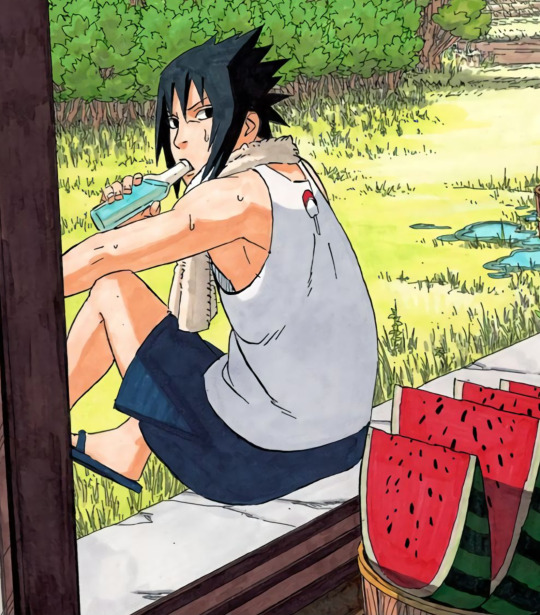

the note here written in katakana words spelled 「ナ」 "na" & 「サ」 "sa"
to express the date in Japanese, the order is reversed compared to English: the year comes first, then the month and finally the day.
in japanese, date is wrote as:
{Day of the Month 日 [hi] · Month 月 [tsuki] }
7月3日 - July 3rd
3月7日- March 7th
3 in japanese is "San" and 7 is "Nana".
So, Sasuke- Sa -is 3 in Japanese - San
as for Naruto- Na- is 7 in Japanese- Nana
Therefore, Japanese consider (7th Month) July 3rd as the NaruSasu day, while (3rd Month) March 7th is the SasuNaru day.
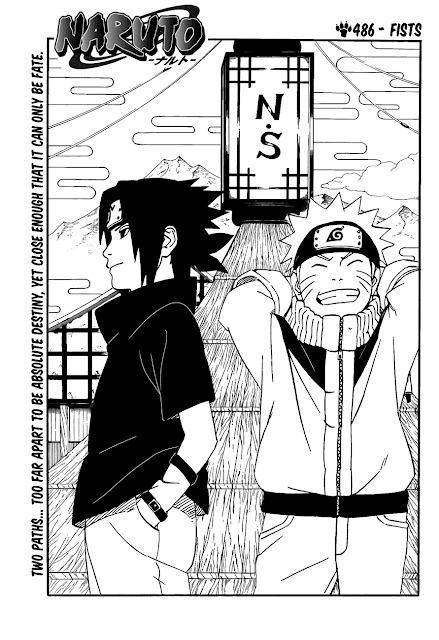
The cover art depicts Sasuke and Naruto from the first part. The lantern-like thing in the center with "N・S" written on it.
#[these two chapters were released in (ch.548) July & (ch. 486) March]#Even locals talked about it as probably representing Naruto/Sasuke or what does “N.S.” mean? Narusasu?#sns#NaruSasu#sasunaru#my stuff
246 notes
·
View notes
Note
Isn't there some wordplay in the original troll monster tidbit? In that the word for troll is something like "to-ru-ro" in Japanese, while tall-man is "to-ru-man" (sharing 2 kanji with troll)? The picture of Laios getting his mind blown comparing both names doesn't make as much sense without that context I think.
Yep! I think it works well enough, tall and troll are similar enough if you ask me


it goes (dividing by syllables) "To o ru ma n" "To o ru" "To u u ru" "To ro o ru!?"
the little - just means the sound lingers a bit thats why I repeated the vowel, so the translation is pretty accurate he is going "tallman, tall, toull, Troll !?"
Hope this doesn't sound too nitpicky but in this case it's called a kana instead of kanji!
Quick Japanese language fun fact they actually have 3 common ways of writing: kanji is the one where they borrow from chinese (Like 日本), hiragana which is the way they write native words along with kanji (Like にほん) and katakana which is one they usually use for foreigner words (Likeトロル for troll in this case)
Both Troll and Tallmen are "foreigner" words so they are using katakana, which you can just say "kana" to mean either that or hiragana
#Translation#Ask#Troll#japanese#hope I didnt sound too much “um actually” I just figured I should clarify#But yeah I also think the joke works better in the original but it's close enough in the translation
103 notes
·
View notes
Text

Today, a super rare name with one super useful kanji! 以勢 is read Ise, and it's not to be confused with the Ise Grand Shrine in Mie, whose Ise is written 伊勢. There are only about 20 people in the country called 以勢, compared to 13,600 with the name 伊勢.
以 can be read も.って or イ. It means because, by means of, in view of, or compared with. Which is kinda nebulous so it’s best to remember it with vocab like the following:
以下 【いか】 the following; less than ~, ~ or fewer 以上 【いじょう】 the aforementioned; not less than ~, ~ or more; that's all, the end, end of document 以内 【いない】 within, inside of, less than 以外 【いがい】 outside (scope), excluding, other than 以前 【いぜん】 before, prior to, ago, the past, previously 以後 【いご】 after this, from now on, thereafter, since then 以来 【いらい】 since ~, henceforth 以降 【いこう】 since ~, from ~ onward, on and after ~
Also, 以 is the source of the hiragana い. The katakana イ comes from 伊, as we covered yesterday.
勢 means forces, energy, or military strength. It's read いきお.い, はずみ, セイ, or ゼイ.
62 notes
·
View notes
Note
Hi,
would you make meta stuff about Mayuri's way of speaking? I mean guy speaks strange way compared to other characters and me with friend don't speak japanese and would like to know more about it.
Thank you! 💜
So, i do want to remind anyone reading my blog but please remember i'm not at all fluent in Japanese. I understand the grammar on a textbook level, and with enough dictionary resources I can poke around and sus out nuances of some word choices (particularly stuff like fictional names of people and swords and attacks and stuff, as those kinds of creative choices are very overt*), especially in irregular usage, but when it comes down to things like dialect, slangs, vernacular or phraseology, or more subtle tone indicators I'm pretty blind.
*(sorry to further clarify: when it's stuff like fantasy jargon it's stuff no one would ever actually say, and so the choices made in crafting those words or names from scratch are all reliably very deliberate. But when looking at more casual speech a lot of character voice just kind of defaults to what "sounds" right, and so the distinction between choosing one common word over another isn't always meaningful or readily apparent, both in general and to someone not fully fluent like me.)
Like if someone talks in a stilted overly technical or dry way I might be able to tell that much, but I'd totally miss more structural things like whether it makes them sound more like a mad scientist -vs- a tryhard edgelord fake intellectual -vs- a man out of time -vs- a stuffy rich person --or what the differences i'd even be looking for between all those would be-- I really can't tell outside of what i might be able to glean from things like narrative context more than the dialog itself.
With the exception of some very tropey, and thus easier to identify things like, movie-esque yakuza slang, or melodramatic historical feudal drama formal titles --and even then those are things i might more readily catch when actually spoken than when written on the page-- i'm just as lost as the next person.
That all being said, there are still a few little things i can sort of pick at without feeling totally out of my depth...
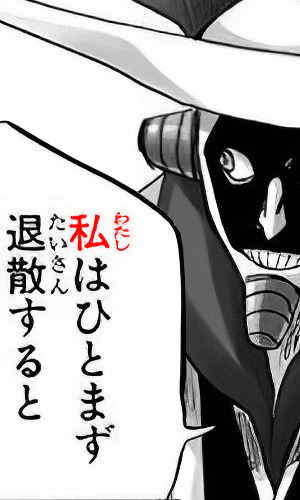
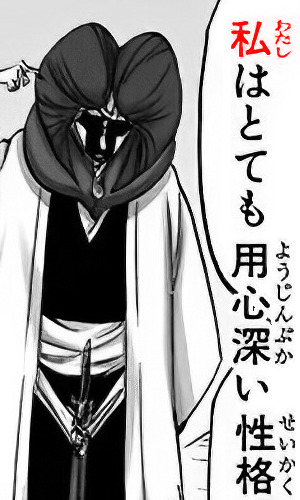
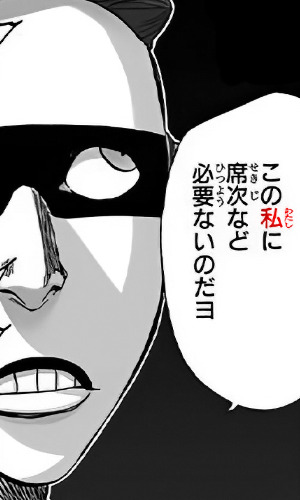
I think it's been brought up on some random post of mine before that Mayuri does notably use a "more feminine" 1st person pronoun, watashi[私] which is a pretty common pronoun, although its usage feels weird to explain in English?
Like... it is considered "gender neutral" in that there are other pronouns that are more specifically feminine or masculine and it's not one of them. But then in practice, you'd basically expect men to opt for one of the more overtly masculine pronouns, which just sort of leaves women with watashi as a default?
So it's not that it explicitly makes him sound ""feminine"" so much as it makes him sound less masculine; which suits his intellectual, non physical inclined, and at times cowardly or at least scheming demeanor. But like, it's also considered a little stuffy and sort of overly formal, or technical which is also appropriate to him.
Oh right and it's a formal pronoun as opposed to informal, but there's also a level of very formal pronouns, and it's not one of those, so that doesn't so much triangulate a position as it just leave in vaguely in the middle of the road...
Does that all make sense? it feels like super overexplaining for what is an extremely commonly used pronoun with mostly very neutral implications.
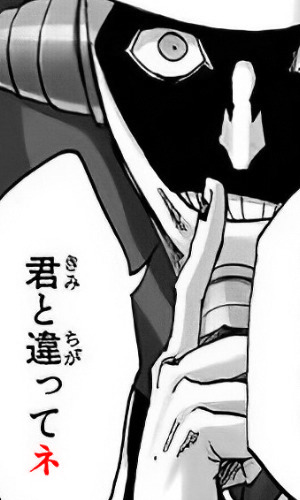
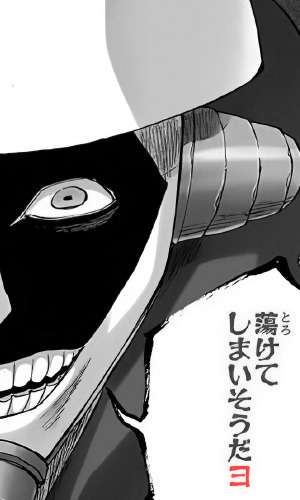
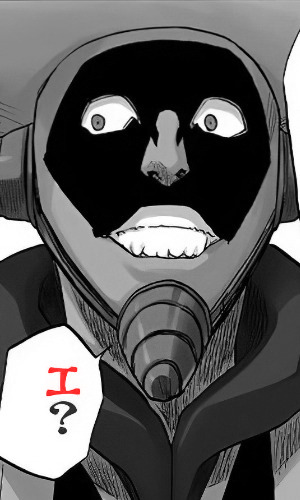
He occasionally ends sentences with a single katakana syllable rather than hiragana, indicating... not quite an "accent".. but like a sort of emphasis. Like a punctuating lilt in tone. Actually Nakao Ryuusei does this really noticeably in the anime and I don't know for sure if I heard it that way in my head and he just nailed it, or if i heard him first and it's just always colored my reading since.
A lot of the rhetorical NE[ネ] which begs confirmation, often translated into English as "...right?" (It's part of that desu ne[ですね] that you hear a lot in anime, where the desu[です] is just the verb to be, so together they tend to translate as "isn't it?")
YO[ヨ] which is again a sort of rhetorical thing that usually gets translated as something like, "...you know?"
and E?[エ?] which isn't even a word or part of speech so much as it's just like, an interrogative noise? Quite literally just "eh?"
But see this is one of those things were like... I can tell it's different from a sort of default neutral mode of speech, but I don't know what that indicates as, like, a point of characterization... Is it specifically condescending? Is it there to sound mechanical or stilted? Is it somehow old fashioned or polite/formal? I have no clue as to these sorts of specifics.
[edit]: I want to reiterate this is a rhetorical device, he's not literally asking a question and waiting for a response. If anything it's functionally the exact opposite, he's saying it to emphasize that he's stating things meant to be taken as facts, it actively closes the dialog off from further questioning.
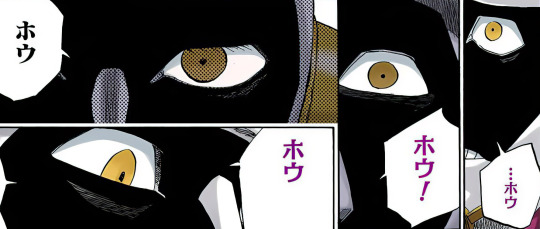
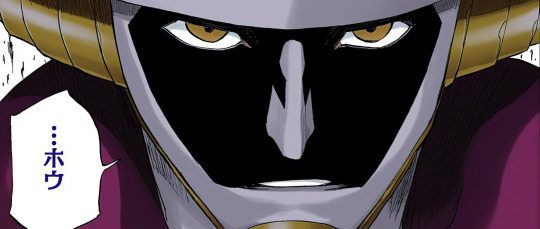
He also says HOU[ホウ] a lot, which also isn't really a word so much as a sound, but given the pattern in speech above I feel like it's kind of inquisitive, or at least contemplative, which is (i think) how I remember Nakao delivering those lines too. Like a sort of, "Oh?" or "Huh..." or "Hmm..."
And given how close the camera gets to his face most times he says it, it gives an impression of being, not "quiet" exactly, but like you had to be close to hear it, so like, almost under his breath? Like it's clearly a noise he makes to himself, it's not like a thing or expression he's making to the other people int he scene.
FUU[フウ] or alternatively HUU, and I think once or twice FUN'/HUN'[フン] as a sort of grunt? not quite as guttural as that, but not quite a sigh? Like a "hmpf."
He also does your classic YARE YARE[ヤレヤレ] which definitely isn't unusual or unique to him but it has this kind "tut tut" or "tch"/"tsk" tone to it and tends to translated very loosely like, "oh my" or "good grief", but I think of it more like a "well, well, well..." but like kind of implicitly more exasperated than that sounds in english?
I don't know where to start trying to qualify, like... what kind of character says yare yare a lot, but it's definitely something that suits some characters more than others, and Mayuri it definitely fits.
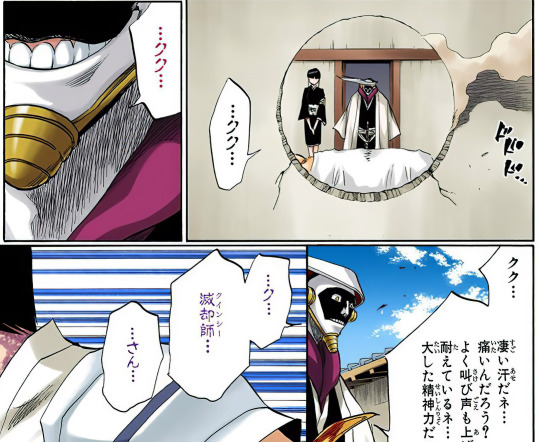
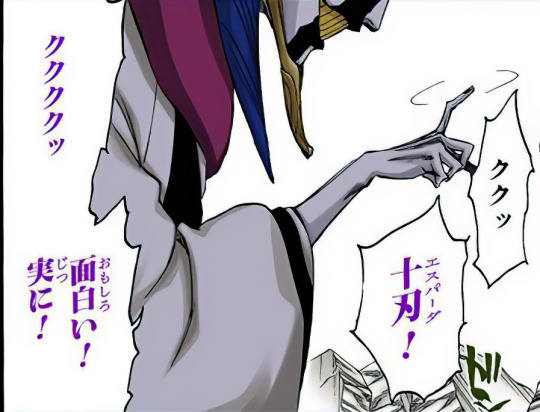
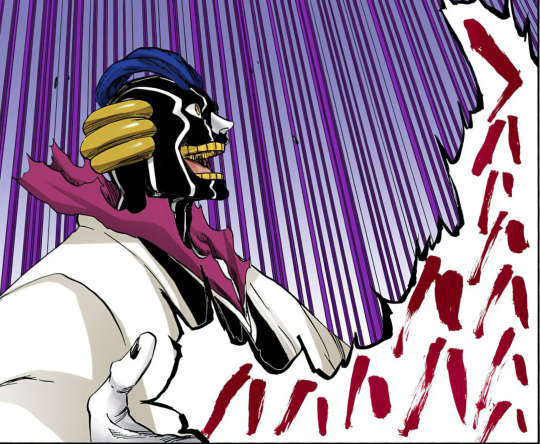
He tends to laugh like ...KU KU...[...クク...] which is a kind of sharp snigger, sneer, or scoff. He really doesn't guffaw or cackle or have much of a more typical dramatic villain laugh, it's very understated.
Although in his fight with Pernida he does let out a full on maniacal FUHAHAHA[フハハハ] laugh for the first time in the whole series
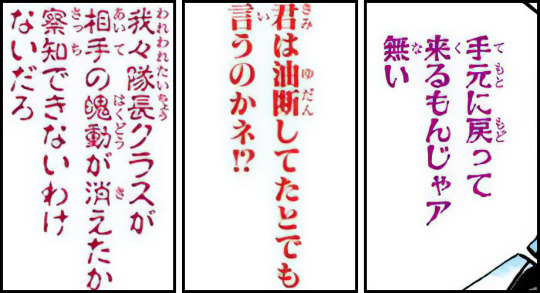
I do love the fonts Kubo uses for a lot of Mayuri's dialog. At a certain point he starts to lean intothe same basic font as everyone else, but particualrly at the beginning he switches between a few unusual ones that are specific to Mayuri.
One's got that rough kind of pseudo handwritten quality to it. It reads to me as kind of scratchy, like a sharp pen nib on thick matte paper, with a kind of clotty ink flow that starts thick and wet but sorta tapers out too fast, leaving the lines spotty and rough.
But he also alternated with a thicker rounder font that has these subtle curls to them that I don't see other character use often.
and then he's got a second font choice that basically has all the same tones as the first one, except maybe a bit, like, louder(?) implicitly just based on context? It tends to be used in creepy action scenes where as the thinner one is more for creepy conversation?
In his very first appearance he chastises Gin, and he changes font between sentences, giving a very distinct sense that it's a change in tone. It reads to me like a low heavy hiss, almost like his voice is normally shallow or throaty, but when the font changes he suddenly drops his voice into a chestier range and speaks almost more smoothly?
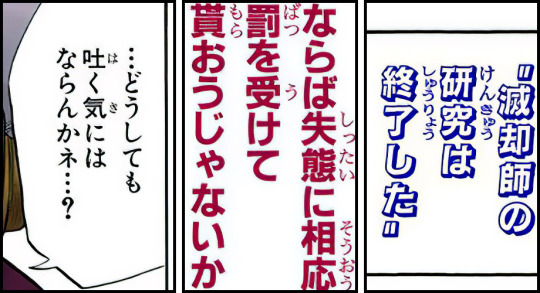
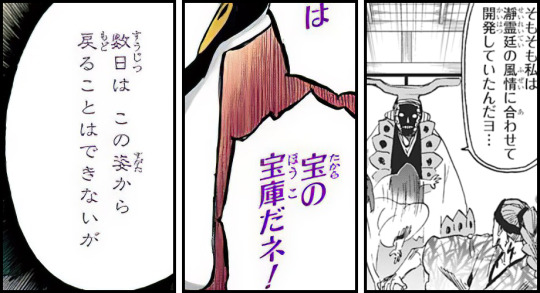
Then there's just the perfectly regular fonts he uses sometimes, basically any/every other character uses these same fonts at some point or another.
and he has a neat thin wispy font that he only uses the one time when he liquefies himself. Along with the voice bubbles used, it gives a super distinct impression of his voice barely being audible.
He also one time speaks enthusiastically in an italic version of the more standard font when he arrives in Hueco Mundo.
And then in the Hell Jaw one shot he just has a completely different standard font because Kubo probably didn't keep track of what fonts he'd been using from like 8 years ago
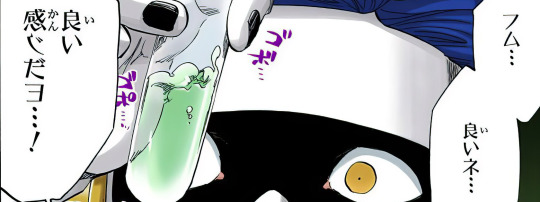
There's also a subtly funky sort of font he uses briefly in the tbtp sidestory? I dunno what to say about this honestly. It gives me these vague 60s-70s vibes that I can't quite place? (I feel like I know i've seen it before but on what? A bowling alley sign? A little back alley cafe? a jazz album cover??)
I have no idea that the take away from that is supposed to be though.
And I guess that's it. I dunno how I thought I was gonna end this. It didn't really reveal any new facets to his character that weren't pretty apparent from the rest of his whole design and demeanor. Plus Nakao's performance in the anime basically nails all of this and i think makes it pretty apparent in tone even if you don't know much about Japanese.
#bleach#bleach meta#weak meta to be honest tho#not confident in this post at all really...#kurotsuchi mayuri#mayuri kurotsuchi
66 notes
·
View notes
Text
i just wanted to hear the different voices of V and Takemura so i played the game in three different languages.
In both the kor and eng versions, goro's dialog felt classy and seasoned, but the jpn ver is a bit more cold and imperative(kiryu-ish?), little bit young. the same goes for the voice acting. They all have their own appeal.


in this texting, jpn ver goro actually used the F-word with katakana. that's incredibly cute.
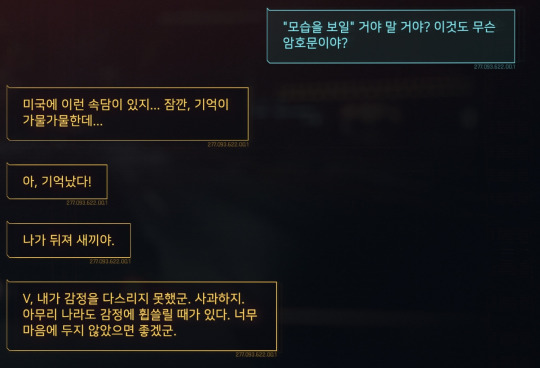
but the kor ver uses korean swear words, "나가 뒤져 새끼야.(Go screw yourself, dude.)" actually this translation is completely bad. quite difficult to understand the context of the conversation.
(jpn voice, kor&eng subtitles are being used in this video. i know it looks a bit chaotic)
anyway my favorite is the eng ver. at tom's dinner, he says, "V, 도움이 필요해. (V, I need help.)" in the kor ver. and the jp ver says, "V, 待て. まだ用がある. (V, Wait. still need to talk.)" but the eng ver...

This is why I started learning English, because he said he need V 🤤
oh and V is very sweetheart in the jpn ver…. compared to the other two ver. kor ver is really savage. and that's my favorite ver V.
(but sometimes jpn ver is a little rougher. for example, V says hello to viktor, "You weren't fucked yet?(まだくたばってなかったの?)". jpn ver of V is especially harsh on viktor. I think he's a bit like a child rebelling against Their dad. lol)
64 notes
·
View notes
Text
Did someone say it’s “Fia talks about localization time”? No? Well too bad I’m talking about Apollo Justice.
Because it’s very funny to me that due to interesting localization, in Japanese Apollo talks in a way that is much less
“Nervous and jittery but trying to psych himself up by doing/saying things that he thinks look cool”
And more so
“Impetuous teenager trying to sound as masculine and serious as he can whilst wanting to explode at any given moment in time”
It’s such an interesting dichotomy because it’d be difficult to localize given that it’s basically him just tone and vibe due to the fact that it’s not WHAT he’s saying necessarily, it’s HOW he’s saying it.
Examples are:
Using the pronoun “オレ” , an extremely masculine and rough pronoun (which is usually used to portray masculinity and confidence in anime/video games but in real life is usually only ever used by men when talking to close friends in private)
The use of *katakana in his dialogue (when not using loan words). It makes his dialogue seem sharper and more forceful for lack of better terms
Sometimes using ぜ as ending particle which is masculine and adds force or indicates command (especially internally) even though he does tend/try to use pretty polite language externally.
*(as you might have seen above “オレ” is written in katakana and it almost always is, especially in his internal monologue)
All of these have been stated to give him a distinct voice when compared to Phoenix, who, in Japanese, talks like a normal, pretty casual guy with a bit of a goofy streak. However, the real nuances of this difference is pretty lost in the ENG version.
While the localization does put more of a focus on Apollo hyping himself up and making himself seem cool, it generally capturing how he comes off as younger (and louder) than Phoenix- however they wasn't able to easily carry over the little edge that made him seem much more "rough," so to speak.
Anyways I just wanted to ramble about translation for a bit and so I did. I hope that this was interesting to at least a few people and served as “Write Apollo as someone who is snide and smarmy” propaganda.
183 notes
·
View notes